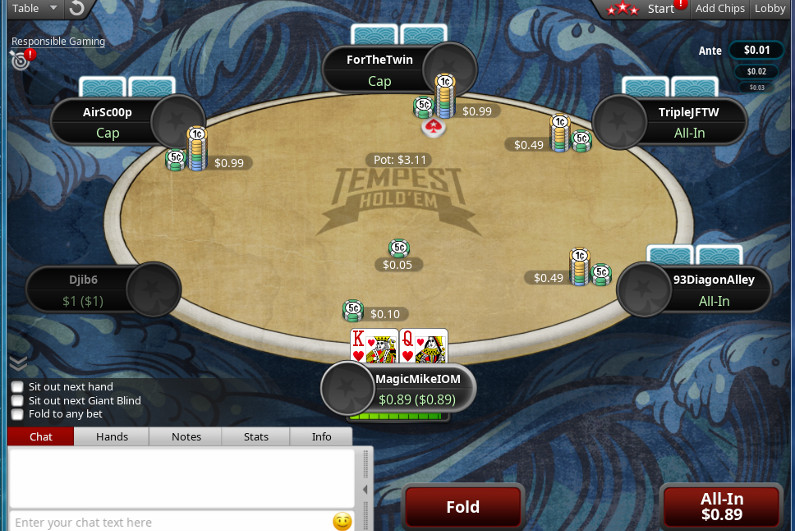Both games are temporary
On Wednesday, PokerStars introduced two new novelty cash games: Deep Water Hold’em and PokerStars Tempest Hold’em.
The pair follows in PokerStars’ recent tradition of limited-time cash games, with titles such as Split Hold’em, Showtime Hold’em, and Unfold having all come and gone.
Deep Water and Tempest come on the heels of PokerStars’ decision to jettison Power Up, its hybrid poker/deck-building eSports product. Power Up was intended to be a permanent game, but it lasted two years.
Some features identical
Deep Water and Tempest were introduced together because both temporary cash games are Six-Handed No-Limit Hold’em at their core. The most noticeable change from standard Hold’em is that, instead of two blinds, there are three.
Deep Water and Tempest add the Giant Blind, which is twice the value of the Big Blind.
In addition to the Small Blind and Big Blind, Deep Water and Tempest add the Giant Blind, which is twice the value of the Big Blind. The player to the left of the Big Blind posts the Giant Blind.
Deep Water is for poker players
Where the two games diverge is in how much poker one gets to play in each. Deep Water is a deep-stacked game, which explains the clever title. The minimum buy-in for a Deep Water game is 50 times the Giant Blind. The maximum is 150 times the Giant Blind. In a $0.25/$0.50/$1.00 game, that’s a buy-in range of $50 to $150.
In a blog post explaining the games, The Stars Group Managing Director Severin Rasset said: “Deep Water is a great opportunity to develop a new way of thinking about NLHE and the combination of three blinds, escalating antes and deep buy-in is sure to shake things up!”
Tempest is for gamblers
Tempest is the opposite, being an extreme short-stacked game. Players can only buy-in for 5 to 10 times the Giant Blind. This alone automatically means there is much less room for poker decisions and strategy than in Deep Water.
even less room to maneuver in Tempest
But there is even less room to maneuver in Tempest because of the other feature: the game is all-in or fold. As it sounds, the only moves a player can make pre-flop are to push all of their chips into the middle or fold their hole cards. That’s it. There is no post-flop play.
In order to keep pots manageable and not let someone who goes on a lucky streak overwhelm the table, all-in bets are capped at an amount equal to the maximum buy-in. So, in a $0.25/$0.50/$1.00 Tempest game, even if a player has built their stack to $60, they can still only go “all-in” for $10.




